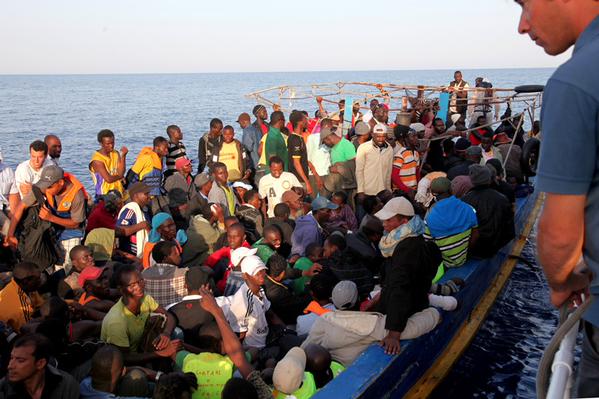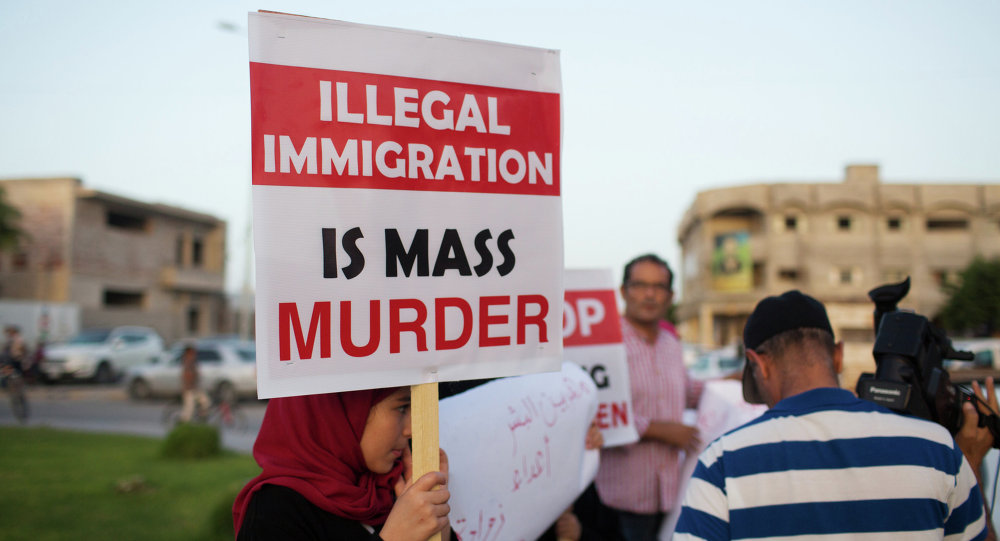De tragiske scener er næsten almindelige begivenheder i landet som vestlige regeringer for kun fire år siden påberåbte som værende et lysende eksempel på en succesrig udenlandsk intervention.
Myndighederne fortsætter deres bestræbelser på at finde omkomne i vandet , efter at bådene sank kort efter at have forladt Libyens kystby Zuwara, med kurs mod Italien.
Kystbyen er blevet kendt som et vigtigt knudepunkt for menneskesmugling hvor enorme antal af indvandrere og asylsøgende fra krigshærgede og fattigdomsramte lande i Mellemøsten og Afrika håber på at nå Europa.
Kaos i Libyen
Den frie hånd som menneskesmuglere og mennesketrafikanter har i Libyen er et tegn på den tilstand af lovløshed som råder i det nordafrikanske land, som har været fastlåst i en fire år lang borgerkrig.
Kommentar: Man hører ikke længere nogen snakke om "et ansvar til at beskytte" Libyerne nu. Det var på overfladen hovedargumentet, nemlig at vi skulle lave en humanitær aktion og redde Libyerne fra Gaddafi. Intet kunne være fjernere fra sandheden.
Landet led allerede under et udbrud af en konflikt mellem oprørske grupper og regeringsstyrker under tidligere leder Muammar Gaddafi, da en NATO ledet alliance, ledet af Storbritannien og Frankrig indledte en bombekampagne for at fjerne den daværende leder.
Efterfølgende Gaddafis død i hænderne på en anti-regerings oprørsgruppe i 2011, priste mange vestlige ledere successen af deres militære indsats i landet, med daværende NATO generalsekretær Anders Fogh Rasmussen kaldende indsatsen "en af de mest succesrige i NATOs historie."

Kommentar: Vi undskylder at resten af artiklen er på engelsk, men vores lille stab må prioritere. Hvis du har lyst til at hjælpe med at oversætte, så skriv blot til sott_da@sott.net
However instead of a democratic revolution promised and preached by Western governments, Libya descended into an ever-increasingly fragmented state, epitomized by conflict between various rebel groups as they fought for control of the country.
The fighting become so severe that the country's internationally recognized government was forced to flee Libya's capital of Tripoli for the eastern city of Tobruk.
On top of this, a number of Islamist groups have taken advantage of the chaos in Libya, with groups like ISIL and Ansar al-Sharia seizing control of various cities and districts across the country, further exacerbating human trafficking concerns.
The West to Blame
Many have criticized the Western intervention in Libya, arguing that the NATO bombing campaign helped to destabilize the country, thus contributing to Libya's current predicament.
Others, such as Nigel Farage, leader of the British political party UKIP, have said that UK Prime Minister David Cameron and others involved in the bombing of Libya "directly caused" the migrant crisis engulfing the country, and in turn, Europe.
"It was the European response that caused this problem in the first place. The fanaticism of [former French president Nicolas] Sarkozy and Cameron to bomb Libya — what they have done is to destabilize Libya, to turn it into a country of much savagery and a place where for Christians the situation is virtually impossible.
"We ought to be honest and say we have directly caused this problem. There were no migrants coming across from Libya in these quantities before we bombed the country and got rid of Gaddafi, however bad he may have been."
Kommentar: Of course Gaddafi must have been 'bad'. Or, just perhaps, NATO was out to murder the 'jewel of Africa' and end the drive towards African unification. But, officially of course, NATO had the best of intentions, and just accidentally murdered an entire culture to save it from the "bad guy".
With increased numbers of migrants risking the perilous voyage from Libya to Europe, many have criticized the West for creating Libya's problems and then merely walking away, without addressing the issues left behind.
The EU's immigration policy has been accused of not offering enough legal avenues for people to resettle in Europe, therefore forcing many to try and seek asylum "illegally."
With an anti-immigration rhetoric sweeping across Europe, and EU countries squabbling to come to an agreement to help re-settle refugees stranded by the migrant crisis, the situation continues to worsen in Libya — leaving many to ponder the results of one of the West's "most successful" foreign interventions.




Kommentar: Se også: